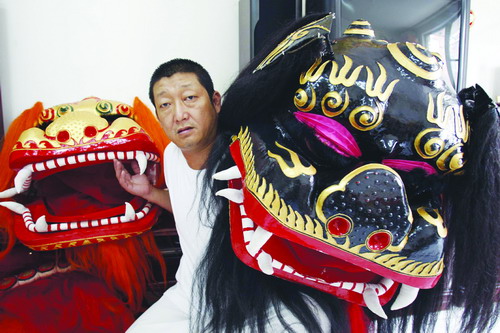Life and Leisure
A roaring success
By Liu Zhihua (China Daily)
Updated: 2010-09-21 07:56
 |
Large Medium Small |
|
 Wang Jianwen took to lion dancing as a diversion from the boredom of his job at the Beijing Banknote Printing Plant. Zhang Wei / China Daily |
Wang Jianwen became a lion dancer by chance, but he has worked hard to preserve the Baizhifang Lion Dance, which is now recognized as a national intangible cultural heritage. Liu Zhihua reports
Wang Jianwen never expected that a light-hearted desire to study martial arts 28 years ago would change his life.
In July 1982, 17-year-old Wang followed in his father's footsteps and started work at the Beijing Banknote Printing Plant. The energetic young man found the work tedious and as a diversion from the boredom he approached a retiring worker and famous martial art practitioner Liu Dehai to learn tongbeiquan (literally, "spreading power from the back boxing", a school of martial arts popular in northern China).
"I learned tongbeiquan as a pastime, and never expected what happened later," Wang says.
Wang had no idea that Liu was also a doyen of lion dancing in the area.
In July 1984, when the plant decided to establish a lion dance team to revive the tradition of lion dancing in the historic Baizhifang neighborhood near the West Second Ring Road, Liu was appointed coach and he invited his young, smart and diligent apprentice to join the team.
"I didn't give it a second thought and agreed right away. My master thought I had potential in lion dancing, but I was simply seeking an escape from the dull daily work, " Wang says.
At that time, the lion dance team members were selected from the plant workers and were allowed time off work to practice lion dancing all day long.
As soon as Wang started learning lion dancing, he was captivated.
"Others considered lion dancing dangerous, but in our eyes, it was much more interesting than the work in the workshops, and we all practiced hard," Wang says.
His debut performance was part of a huge celebration party for the 35th anniversary of the foundation of the People's Republic of China on Oct 1, 1984.
Although excited and nervous, Wang and his colleagues managed to impress an audience of hundreds of thousands that included former leader Deng Xiaoping.
From then on, lion dancing became an essential part of daily life for Wang and the other team members.
"We received lots of invitations and requests. Performing took up four to five months a year in the 1980s," Wang recalls.
The lion dance team maintained a steady crew of no less than 11, and attracted ample apprentice applicants from the plant workers.
"But lion dancing requires strength, patience and intelligence, we were very strict in selecting team members," Wang says.
In 1993, when Liu retired, Wang became coach of the team. But with the development of the market-oriented economy, he found it harder and harder to recruit new members.
"The plant provides us with excellent facilities, but the lack of fresh blood is a grave problem," Wang says.
Lion dancing is no longer appealing to young men who can earn more money working instead of joining the team.
"It doesn't feel right to persuade people to abandon work for lion dancing when people are so busy making money nowadays," Wang says.
Another problem, according to Wang, is that most of the new employees are college graduates and too old to start learning lion dancing.
Since 1995, there has also been a sharp decline in requests for lion dancing. However, despite the difficulties Wang and his team are trying hard to preserve the tradition.
From 2001 to 2005, Wang taught lion dancing to students at Beijing Sports University and helped to establish the college's first lion dance course.
Later, he taught lion dancing at the Capital Institute of Physical Education.
To make the dancing less physically demanding he uses paper pulp instead of fiberglass to make the lion-head costume, so as to reduce the weight.
In 2006, Baizhifang Lion Dance was listed as Beijing's intangible cultural heritage, and in 2008 a national intangible cultural heritage. Wang was the seventh heir of the cultural legacy.
"It all happened beyond my imagination. I became the inheritor of Baizhifang Lion Dance by just following my interests," Wang says.